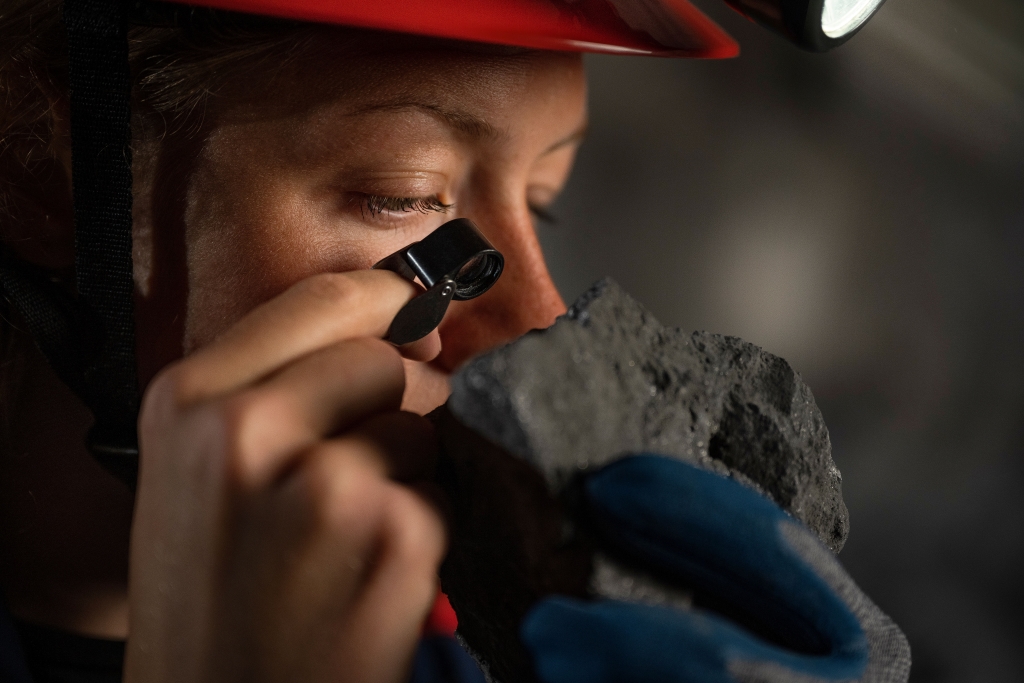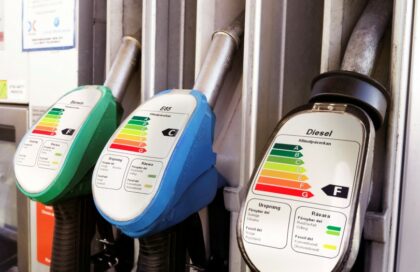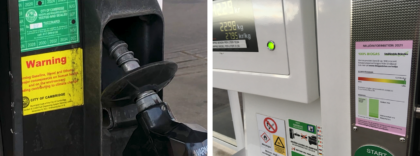Many stakeholders are asking for the inclusion of life-cycle data on mandatory eco-labels on cars, as input to the upcoming evaluation of EU’s car labelling Directive. The Swedish government has proposed such eco-labels as part of their Climate policy action plan.
Photo: LKAB
EU’s car labelling Directive (1999/94/EG) requires disclosure of the fuel consumption and tailpipe CO2-emissions of new passenger cars. It was evaluated by the European Commission in 2016, and will be evaluated again this year, since the Commission assesses that “markets, society and the EU’s policy framework have evolved significantly” since 2016.
This is certainly so. The share of electric cars among new registrations in the EU has risen from 0,4 percent in 2016 to 14,6 percent in 2023. In Sweden, the shares were 0,8 and 37,8 percent, respectively. The market share of electric cars is expected to continue to rise rapidly.
Life-cycle data are needed
To stay relevant, car labels must become relevant to electric cars. There is a lot at stake in the electrification of road transport. The mining, processing, and recycling of critical minerals to batteries and electric motors must be scaled up rapidly.
Eco-labels with life-cycle data covering vehicle production and end-of-life reduce the risk that people and the environment are harmed in this gold rush. Transparency from the onset of the transition also reduces the risk of the backlash that may follow if severe wrongdoings are uncovered later.
Mandatory disclosure of greenhouse gas emissions from the production and end-of-life phases provides incentives to choose sustainable or recycled materials. For example, Volvo Cars aims to use sustainable steel in their cars and collaborates with Swedish steelmaker SSAB to this end.
Life-cycle data are coming
To make car labels with life-cycle data trustworthy and comparable, a common method of life-cycle assessments (LCA) of cars is necessary. Such a standardisation will be introduced in the EU no later than January 31, 2025, according to Regulation (EU) 2023/851.
The battery Regulation (EU) 2023/1542 mandates that the carbon footprint of electric car batteries is disclosed starting from 2025, and the recycled share of cobalt, lead, lithium or nickel from 2028. The proposed Regulation on circularity requirements for vehicle design and on management of end-of-life vehicles requires that the recycled shares of aluminium, magnesium, steel are disclosed, as well as the recycled share of rare earth minerals in electric motor magnets.
Car labels with life-cycle data proposed in Sweden
In 2022, the Swedish Energy Agency published a report commissioned by the government that presented suggestions how eco-labels with life-cycle perspective may be designed. The Swedish government circulated this report for comments in spring 2023. Gröna Mobilister (Green Motorists Sweden) handed in a response with some detailed suggestions. The organisation has been campaigning for such labels since 2019.
In December 2023, the Swedish government included mandatory eco-labels on new cars with life-cycle perspective in its Climate policy action plan.
Call for evidence
The European Commission (EC) recently called for evidence to their evaluation of the car labelling Directive. Out of 28 responding organisations, no less than 19 promoted car labels with life-cycle data, or brought up the issue with interest, including No organisation opposed it.
Some examples of responses to the call from EC relating to LCA from national agencies, NGOs, consumer organisations and industry are cited at the bottom of this page.
Reactions from the automotive industry
In the response to the Commission, Tesla Motor Netherlands proposes an Eco-Score for zero-emission vehicles with elaborate life-cycle data. In 2021, Swedish representatives of Tesla told Gröna Mobilister that they encourage the work at the EU-level to standardise the LCA-methodology, and that they welcome the new battery regulation.
Similarly, Swedish representatives of BMW told Gröna Mobilister in 2021 that they consider LCA to be “super important”.
Already in 2019, Swedish representatives of Toyota and Volvo Cars told Gröna Mobilister that they appreciate that the organisation brings up the LCA issue. Volvo Cars expressed that they welcome efforts to standardise LCA for cars, so that they become better suited for consumer information.
In 2023, Gröna Mobilister made a more comprehensive survey among car companies on the Swedish market. The national representatives of the following brands welcomed eco-labels on cars with life-cycle data: Audi, Isuzu, Kia, Lexus, Mazda, Seat, Skoda, Polestar, Porsche, Subaru, Toyota, Volkswagen, and Volvo Cars. No responding company opposed it.
Volvo Cars and Polestar have promised to publish LCAs of all new electric car models voluntarily. The German headquarters of the Volkswagen Group stated to Gröna Mobilister in 2023 that they are working on a process to communicate the carbon footprint of all cars.
The European Automobile Manufacturers’ Association (ACEA) seems to have become more supportive lately. In the response to the commission, the organisation writes: ”LCA could be a potential option in the long-term for labelling based on the agreed methodology”.
Will labels with life-cycle data make a difference?
The European energy labels have become well known and have helped improve the energy efficiency of appliances. The Euro NCAP safety rating have also become well known and have help making cars safer. Likewise, harmonised car labels with life-cycle data and a visually striking rating system would help reducing the emissions from road transport, pushing the entire automotive industry in a sustainable direction.
Specifically, disclosure of the use of natural resources and emissions in the production phase may help counteract the absurd trend that new cars are becoming larger and heavier each year. In Sweden, an average new diesel car has gained about 400 kg in 10 years, from 2013 to 2023, and an average new electric car has gained about 500 kg.
– Transparency is an expression of confidence, says Jesper Johansson, President of Gröna Mobilister. There are sustainability challenges with electric cars, but they can be solved. Eco-labels with life-cycle data may help doing so.
Read more
Evaluation of EU’s car labelling Directive, with responses to the call for evidence
The response by Gröna Mobilister (Green Mobilists Sweden), and the response from the Swedish 2030-secretariat.
“Electric vehicles have no tailpipe emissions, and a significant part of their environmental impact arises during production. Given the current pace of developments of electric vehicles and their batteries, much of which had barely started in 1999, as well as the legislative progress in the areas of circularity and material efficiency, there is a pressing need to update the rules governing consumer information on vehicles environmental performance as a whole.”
Swedish Energy Agency
“information on the carbon footprint of a car – from the production of the car, to the direct and indirect energy/emissions for running the car over a life time – would deliver an additional value for consumers.”
Austrian Ministry for Climate Action, Environment, Energy, Mobility, Innovation and Technology
“If such clear rules for car labelling with life-cycle perspective are adopted, car labelling would probably help reduce the carbon footprint of road vehicles to a considerable degree, comparable to the significant increase in energy efficiency of appliances caused by the European energy labels.”
Gröna Mobilister
The EU labelling should henceforth use a life-cycle perspective, displaying greenhouse gas emission from a cradle-to-cradle perspective, based on the common methodology for life-cycle analyses of cars which is to be adopted by the EU 31st of December 2025 at the latest (EU2023/851). The percentage of recycled material should also be made public per key component or raw material, as well as the countries of origin for all materials above a certain threshold.
the Swedish 2030-secretariat
“To support a responsible shift to e-mobility, the label for BEVs should be updated to include a score based on the efficiency of the electric vehicle as well as the climate and resource impact of its production. […] providing this information will help improve trust in the environmental benefit of switching to BEVs.”
Transport & Environment
“Within the label, it is important to make room for more efficient EVs and those produced sustainably.”
BEUC – The European consumer organisation
“The nature of labelling ICE cars based on fuel economy and tailpipe CO2 emissions is not conducive to a like-for-like comparison with EVs. This may limit the ability of consumers to make meaningful comparisons, such as lifecycle CO2 emissions and average running costs, which may be useful to make informed choices.“
Fédération Internationale de l’Automobile European Bureau (FIA EB)
“the emissions and material costs arising over the vehicle’s entire life should also be taken into account in the consumer information. This would be an additional incentive for the production of small, light vehicles that use fewer resources.” (Translated from German.)
Verbraucherzentrale Bundesverband
“life cycle emissions, which would also include those emissions that arise during vehicle production and vehicle recycling, could also be brought closer to consumers in digital form.” (Translated from German.)
Der Österreichische Automobil-, Motorrad- und Touring-Club
“We propose the introduction of an Eco-Score exclusively for zero-emission vehicles”. The proposal includes, among other things: “The carbon footprint of the battery”, “[t]he embedded carbon emissions of steel and aluminium”, and “[t]he levels of recycled content”.
Tesla Motors Netherlands
”LCA could be a potential option in the long-term for labelling based on the agreed methodology, but further analysis would be necessary to derive a meaningful and fair instrument for OEMs and customers in all member states.“
ACEA – The European Automobile Manufacturers’ Association
“To account adequately for the various technologies needed for a successful transition, the car labelling directive should be based on well-to-wheel emissions or life-cycle emissions.”
CLEPA – the association of the European Automotive Supplier Industry
Contact
Per Östborn, Campaign manager, per.ostborn@gronamobilister.se, +46 738 19 61 54



